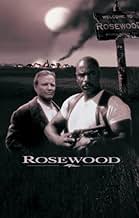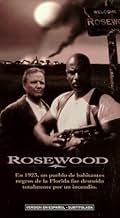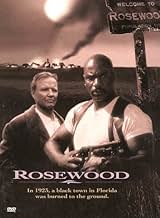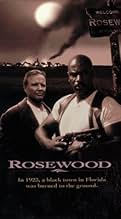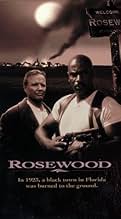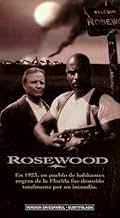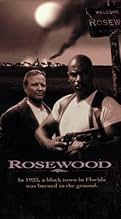IMDb RATING
7.2/10
9.1K
YOUR RATING
A dramatization of a 1923 horrific racist lynch mob attack on an African-American community.A dramatization of a 1923 horrific racist lynch mob attack on an African-American community.A dramatization of a 1923 horrific racist lynch mob attack on an African-American community.
- Awards
- 3 wins & 10 nominations total
- Director
- Writer
- All cast & crew
- Production, box office & more at IMDbPro
Storyline
Did you know
- TriviaAfter Wynton Marsalis' score was rejected, he released his score as an album called "Reeltime".
- GoofsIn the title sequence, the date is Thursday, December 31, 1922; in reality, that date was a Sunday.
- SoundtracksSylvester's Blues
Written by Wynton Marsalis
Produced by Delfeayo Marsalis
Performed by Eric Reed
Courtesy of Impulse Records
Featured review
John Singleton's Rosewood documents the tragedy of the Rosewood Massacre in piercingly raw detail, showing us how a prosperous Florida town fell to shambles from one woman's lie, spawning over a hundred murders and massive calamity on the survivor's shoulders for years to come. This event occurred in 1923, but is usually left unprinted in history textbooks and shoved to the side as if it had never occurred. Just a few weeks ago, a gunman opened fire on patrons in a movie theater, killing twelve and wounding fifty eight. That story was the most talked about thing for the entire week and still sneaks its way into the top story.
Rosewood isn't written with anger, hostility, or a burdening grudge. It is written with its mind firmly centered on history and examination rather than shameful exploitation. The town of Rosewood was populated mainly by blacks who are also operating most of it, with the notable exception of the white grocery store owner, Mr. Wright (Jon Voight). About 1/3 of the town is white, and most have a great disdain for the blacks, which as we know by now wasn't atypical.
The film centers mainly on Mann (Ving Rhames), a World War I veteran who travels aimlessly on a horse in search of land that he is willing to pay good money for. When he shows up at a town auction and becomes one of the highest bidders, he does nothing but generate sneers and racist remarks from the patrons. Mann is, for the most part, impassive towards the criticism. One of his friends that he grows closer to over time is Don Cheadle's Sylvester, who happens to be one of the strongest character actors of this or any other decade.
The hostility towards blacks skyrockets when the mentally unstable woman, Fanny Taylor (Catherine Kellner) is triggered into a screaming frenzy repeatedly saying a black man beat her, but did not rape her. The reality is, Fanny is a victim to the abuse of her lover, who consistently throws her around and leaves her bruised and battered. Regardless, there is simply no justification for this kind of impulsiveness.
And thus, the bell begins to ring louder and for longer and the towers slowly begin to fall; the town becomes even more racially divided than before, violence breaks out in the streets, houses are burned, neighbors become enemies, and secrets holding important, valuable information are kept until it's too late. A white sheriff (Michael Rooker) has an understanding of the events that occurred with Fanny Taylor, begins to piece together that the story of the evil black man beating the white woman is a myth, but is unfortunately silent about the event until violence overwhelms the once humble town. Even Mann grows aware of the impending violence and unsafe nature of this town, and fears because of his "new" status that he will fall victim to murder.
The film touches on some other topics not usually explored in a period piece, such as how the idea of racism is spread through explicit teachings from father to son. One father teaches his son how to make a noose, and continuously reminds him that the blacks are the enemies in which the whites must take action against. This even involves the father taking the son along on trips where they go hunting, and I don't mean for animals.
Writer Gregory Poirier illustrates this story on a large, limitless canvas for John Singleton to direct with a looming challenge. There is an unusually broad amount of talent here and a plethora of characters and situations to document, and Poirier is careful never to spend too much time on one specific situation, but takes the time to balance the events out evenly. It wasn't long before this that Singleton constructed Boyz N The Hood, a film detailing the tribulations of growing up on the wrong side of the street. That appears on my list of most captivating dramas for its poignant dialog and incredible performances. Rosewood is in an entirely different league; a film that features many different scenes, all highly detailed and illustrated intricately, that is strung together by an easily understandable story.
Speaking in terms of aesthetics, the costume and set design here is lavish and meticulous. From the sets of the stores, to the simplicity of the roads, the people, the clothing, and the shops, everything is portrayed in such a refreshingly different light that it becomes indescribably powerful. The care and attention here is not only commendable, but award worthy.
Yet sadly, Rosewood, like the actual event, is a long forgotten wave in the ocean of cinema and the world. The film's hefty budget, for which I assumed was mainly used on costumes, set structures, and actors, proved unable to be recouped and went on to become a commercial failure, only seen by those brave enough to endure its tragedy with an open mind and a hungering for knowledge. This is not a movie that many will be able to digest easy. It's a long and brutal picture. But one that is masterfully done in almost every respect and one that should brew a healthy, informative conversation soon afterwards.
Starring: Jon Voight, Ving Rhames, Don Cheadle, Bruce McGill, Loren Dean, Esther Rolle, Elise Neal, and Michael Rooker. Directed by: John Singleton.
Rosewood isn't written with anger, hostility, or a burdening grudge. It is written with its mind firmly centered on history and examination rather than shameful exploitation. The town of Rosewood was populated mainly by blacks who are also operating most of it, with the notable exception of the white grocery store owner, Mr. Wright (Jon Voight). About 1/3 of the town is white, and most have a great disdain for the blacks, which as we know by now wasn't atypical.
The film centers mainly on Mann (Ving Rhames), a World War I veteran who travels aimlessly on a horse in search of land that he is willing to pay good money for. When he shows up at a town auction and becomes one of the highest bidders, he does nothing but generate sneers and racist remarks from the patrons. Mann is, for the most part, impassive towards the criticism. One of his friends that he grows closer to over time is Don Cheadle's Sylvester, who happens to be one of the strongest character actors of this or any other decade.
The hostility towards blacks skyrockets when the mentally unstable woman, Fanny Taylor (Catherine Kellner) is triggered into a screaming frenzy repeatedly saying a black man beat her, but did not rape her. The reality is, Fanny is a victim to the abuse of her lover, who consistently throws her around and leaves her bruised and battered. Regardless, there is simply no justification for this kind of impulsiveness.
And thus, the bell begins to ring louder and for longer and the towers slowly begin to fall; the town becomes even more racially divided than before, violence breaks out in the streets, houses are burned, neighbors become enemies, and secrets holding important, valuable information are kept until it's too late. A white sheriff (Michael Rooker) has an understanding of the events that occurred with Fanny Taylor, begins to piece together that the story of the evil black man beating the white woman is a myth, but is unfortunately silent about the event until violence overwhelms the once humble town. Even Mann grows aware of the impending violence and unsafe nature of this town, and fears because of his "new" status that he will fall victim to murder.
The film touches on some other topics not usually explored in a period piece, such as how the idea of racism is spread through explicit teachings from father to son. One father teaches his son how to make a noose, and continuously reminds him that the blacks are the enemies in which the whites must take action against. This even involves the father taking the son along on trips where they go hunting, and I don't mean for animals.
Writer Gregory Poirier illustrates this story on a large, limitless canvas for John Singleton to direct with a looming challenge. There is an unusually broad amount of talent here and a plethora of characters and situations to document, and Poirier is careful never to spend too much time on one specific situation, but takes the time to balance the events out evenly. It wasn't long before this that Singleton constructed Boyz N The Hood, a film detailing the tribulations of growing up on the wrong side of the street. That appears on my list of most captivating dramas for its poignant dialog and incredible performances. Rosewood is in an entirely different league; a film that features many different scenes, all highly detailed and illustrated intricately, that is strung together by an easily understandable story.
Speaking in terms of aesthetics, the costume and set design here is lavish and meticulous. From the sets of the stores, to the simplicity of the roads, the people, the clothing, and the shops, everything is portrayed in such a refreshingly different light that it becomes indescribably powerful. The care and attention here is not only commendable, but award worthy.
Yet sadly, Rosewood, like the actual event, is a long forgotten wave in the ocean of cinema and the world. The film's hefty budget, for which I assumed was mainly used on costumes, set structures, and actors, proved unable to be recouped and went on to become a commercial failure, only seen by those brave enough to endure its tragedy with an open mind and a hungering for knowledge. This is not a movie that many will be able to digest easy. It's a long and brutal picture. But one that is masterfully done in almost every respect and one that should brew a healthy, informative conversation soon afterwards.
Starring: Jon Voight, Ving Rhames, Don Cheadle, Bruce McGill, Loren Dean, Esther Rolle, Elise Neal, and Michael Rooker. Directed by: John Singleton.
- StevePulaski
- Aug 8, 2012
- Permalink
- How long is Rosewood?Powered by Alexa
Details
Box office
- Budget
- $25,000,000 (estimated)
- Gross US & Canada
- $13,130,349
- Opening weekend US & Canada
- $3,154,075
- Feb 23, 1997
- Gross worldwide
- $13,130,349
- Runtime2 hours 20 minutes
- Color
- Sound mix
- Aspect ratio
- 2.39 : 1
Contribute to this page
Suggest an edit or add missing content



